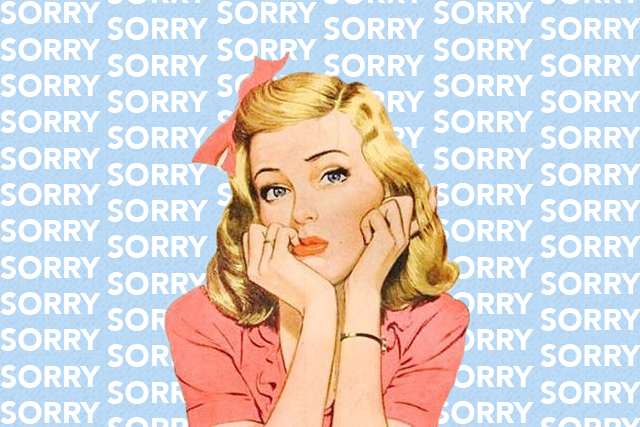
“I’m sorry” is a powerful sentence. It’s also overused by women. “Women in my generation were raised to feel guilty if we were anything less than an emotional service station to others,” writes Dr. Harriet Lerner in Psychology Today. “We may be quick to feel responsible for everything. As comedian and writer Amy Poehler puts it, ‘It takes years as a woman to unlearn what you have been taught to be sorry for.'”
Being bullied a lot while growing up made me apologetic for a lot of things so I know I’m guilty of this. Past that, I’ve noticed how I use it for everything that connotes the smallest indication of my existence. Recently, a friend of mine had to call me out for constantly saying sorry when I ranted to him about my problems. “What are you sorry for? It’s life,” he said. I realized I was apologizing for sharing my bad experiences and feelings. From the hushed ways our teachers scolded us with for doing anything “unlady-like” to the random comments of strangers when we express something deemed less than “appropriate,” women are expected to keep everything breezy and beautiful. The apology is merited when we break it and show that we can’t keep up.
We say sorry even for instances that don’t need it. Take up one whole minute to get to your booked ride, barely cutting your two-minute allowance, and you can tell drivers already expect your say something. Some even tell you off or mention how they almost wanted to cancel out. What do you say? I’ll give one guess as to what it is.
A faint “sorry” is also an effective conversation stopper. When opinions get too intense or provoke the person you are talking to, somehow the tone shifts. You feel you ruffled feathers or cause a ripples in the water that wasn’t necessary. Let that five letter word fly and you’ll see how it settles like nothing happened. Oh, and as for the opinions you just expressed? It’s not that valid anymore since you caused such drama. Yes, you said sorry for voicing out what’s in your mind.
In a story by the The New York Times, Sloane Crosley shows how we say sorry even to the waiter when we point out an error in their service or in our order. “For so many women, myself included, apologies are inexorably linked with our conception of politeness. Somehow, as we grew into adults, ‘sorry’ became an entry point to basic affirmative sentences.” The “sorry” then transforms into a tool to couch simple requests or to state facts that contradict a current scenario. “Sorry, I’m allergic to dairy.” Girl, you’re already deprived of chocolate milk, you shouldn’t be made to feel at fault for something you didn’t want.
We need to reflect on how we use “I’m sorry” and the sincerity of apologies. Think about the number of times you say it in a day. Do you really mean it or is just a pre-set in your daily life? Look at the people around you who feel entitled to your apologies. Are there times when you are manipulated to say it just to make everything more pleasant? What are you really sorry about? Most of the time, it might not be something that deserves your apology.
Take care of the word “sorry.” It’s precious. It’s not something to use trivially. Don’t feel or say sorry for simply living your life and for the (good or bad) incidentals that come with it. If you need more pointers on when you should really say sorry, look up Lena Dunham and the history of ridiculous things she hasn’t apologized for.
Art by Lara Intong
Follow Preen on Facebook, Instagram, Twitter, Snapchat, and Viber
Related stories:
Why Women Can’t Get Angry
Why Do People Think Women Can’t Handle Being a Mother and a Career Woman?
Tattoos, Women, and Slut-Shaming: Why Does It Happen Anyway?
Girl Watching and Why Men Can’t Take Sexual Harassment Seriously


